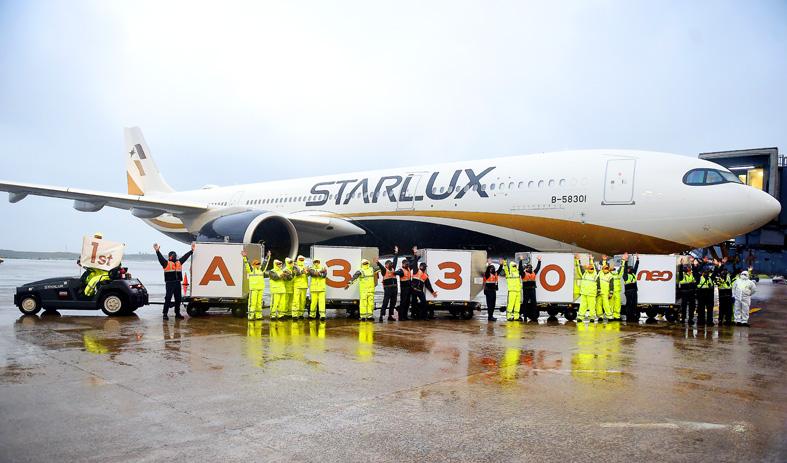Start-up Starlux Airlines Co (星宇航空) earlier this month had a fresh capital injection of NT$4 billion (US$136.94 million) at the request of the country’s top aviation regulator, after the airline reported a net loss of NT$3.01 billion for the whole of last year.
Ninety percent of the NT$4 billion came from Starlux chairman Chang Kuo-wei (張國煒) and the other 10 percent from other major shareholders and StarLux employees, the airline said in a statement yesterday.
Starlux said it would continue to review whether more capital is needed.

Photo: Chu Pei-hsiung, Taipei Times
The injection brought the airline’s paid-in capital to NT$15.36 billion, company data showed.
Starlux, which was established in 2018 and offered its first flight in January 2020, has had a bumpy ride because of the COVID-19 pandemic — it reported an aggregate net loss of NT$5.4 billion over the past two years, the largest loss among local airlines, data released by the Civil Aeronautics Administration (CAA) showed.
Late last year, the CAA required the airline to increase its capital because its accumulated losses totaled NT$6.93 billion, more than half of its paid-in capital of NT$11.36 billion.
Unlike other airlines that have shifted to air cargo to offset the loss in passenger revenue during the COVID-19 pandemic, Starlux’s cargo capacity is limited, as it only operated six single-aisle Airbus A321neo planes last year, company data showed.
However, the airline said it still tried to increase its revenue by shifting its flights to destinations with stable passenger demand, as well as cities that are hubs for cargo operations, it said.
Starlux’s revenue last year totaled NT$795 million, doubling from a year earlier and ranking fifth in Taiwan, after China Airlines (CAL, 中華航空), EVA Airways Corp (長榮航空), Uni Airways Co (立榮航空) and Mandarin Airlines (華信航空), CAA data showed.
Starlux’s growth in revenue is the highest among local airlines, followed by CAL’s 24 percent rise and EVA Airways’ 20 percent increase, the CAA data showed.
However, Starlux’s net assets per share last year stood at NT$3.96, the lowest among local airlines, while its debt ratio was 82 percent, the second-biggest after Daily Air Corp’s (德安航空) 87 percent, the data showed.
The airline said it plans to receive more A321neo jets and A330neo planes this year to expand its capacity on the expectation that air travel would recover as countries ease their border controls.

POWERING UP: PSUs for AI servers made up about 50% of Delta’s total server PSU revenue during the first three quarters of last year, the company said Power supply and electronic components maker Delta Electronics Inc (台達電) reported record-high revenue of NT$161.61 billion (US$5.11 billion) for last quarter and said it remains positive about this quarter. Last quarter’s figure was up 7.6 percent from the previous quarter and 41.51 percent higher than a year earlier, and largely in line with Yuanta Securities Investment Consulting Co’s (元大投顧) forecast of NT$160 billion. Delta’s annual revenue last year rose 31.76 percent year-on-year to NT$554.89 billion, also a record high for the company. Its strong performance reflected continued demand for high-performance power solutions and advanced liquid-cooling products used in artificial intelligence (AI) data centers,

SIZE MATTERS: TSMC started phasing out 8-inch wafer production last year, while Samsung is more aggressively retiring 8-inch capacity, TrendForce said Chipmakers are expected to raise prices of 8-inch wafers by up to 20 percent this year on concern over supply constraints as major contract chipmakers Taiwan Semiconductor Manufacturing Co (TSMC, 台積電) and Samsung Electronics Co gradually retire less advanced wafer capacity, TrendForce Corp (集邦科技) said yesterday. It is the first significant across-the-board price hike since a global semiconductor correction in 2023, the Taipei-based market researcher said in a report. Global 8-inch wafer capacity slid 0.3 percent year-on-year last year, although 8-inch wafer prices still hovered at relatively stable levels throughout the year, TrendForce said. The downward trend is expected to continue this year,

Vincent Wei led fellow Singaporean farmers around an empty Malaysian plot, laying out plans for a greenhouse and rows of leafy vegetables. What he pitched was not just space for crops, but a lifeline for growers struggling to make ends meet in a city-state with high prices and little vacant land. The future agriculture hub is part of a joint special economic zone launched last year by the two neighbors, expected to cost US$123 million and produce 10,000 tonnes of fresh produce annually. It is attracting Singaporean farmers with promises of cheaper land, labor and energy just over the border.

US actor Matthew McConaughey has filed recordings of his image and voice with US patent authorities to protect them from unauthorized usage by artificial intelligence (AI) platforms, a representative said earlier this week. Several video clips and audio recordings were registered by the commercial arm of the Just Keep Livin’ Foundation, a non-profit created by the Oscar-winning actor and his wife, Camila, according to the US Patent and Trademark Office database. Many artists are increasingly concerned about the uncontrolled use of their image via generative AI since the rollout of ChatGPT and other AI-powered tools. Several US states have adopted